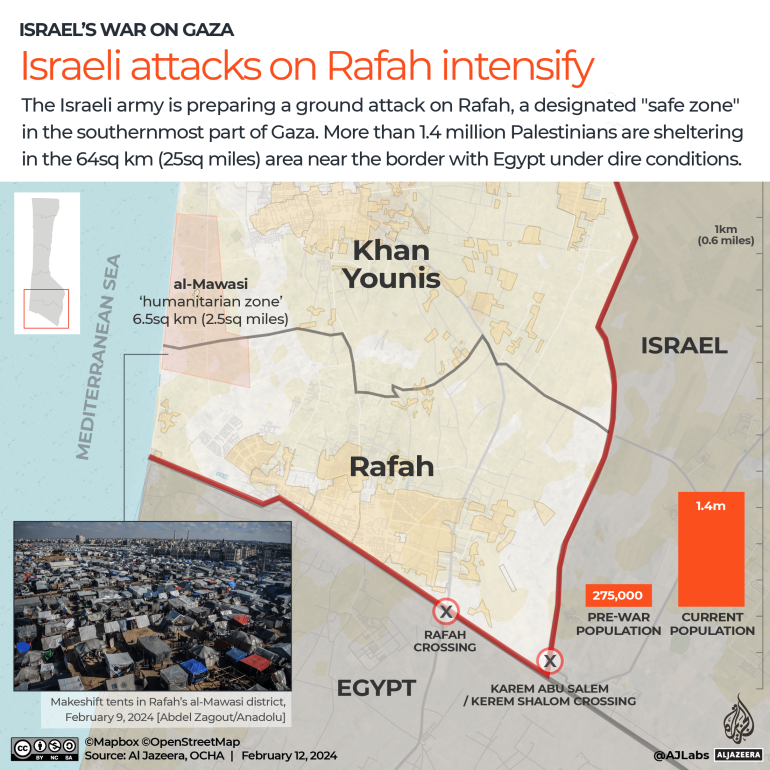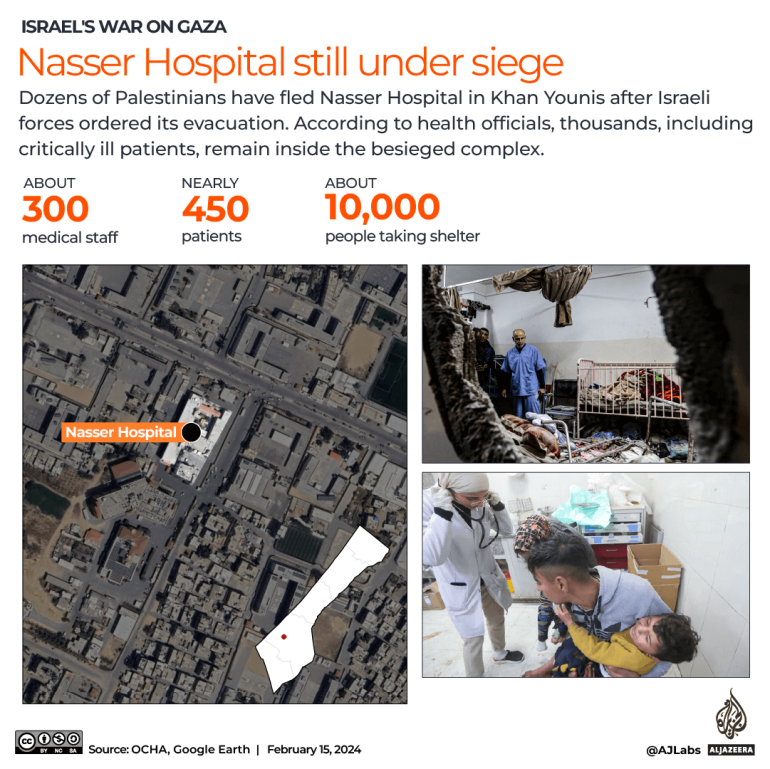The Israeli military has launched a new wave of air raids and artillery fire in southern Gaza, forcing Palestinians to flee overcrowded Rafah in advance of a feared ground invasion that world leaders have condemned.
The United Nations humanitarian agency, OCHA, said on Thursday that people, already displaced several times in the four-month conflict, were heading to Deir el-Balah and the Nuseirat refugee camp in the central Gaza Strip.
Rafah was a designated “safe zone” and the last refuge for Palestinians forced to escape Israel’s attacks by land, air and sea across the rest of the enclave. An estimated 1.4 million Palestinians found some measure of security there in tents and makeshift shelters.
UN aid chief Martin Griffiths warned that Palestinians in Rafah might be forced into Egypt if Israel launches its planned military operation against the border city.
“The possibility of a military operation in Rafah, with the possibility of the [border] crossing closing down, with the possibility of spillover … a sort of Egyptian nightmare … is one that is right before our eyes,” Griffiths told diplomats at the UN in Geneva on Thursday.
He said the notion that people in Gaza could evacuate to a safe place was an “illusion”.
“We must all hope that friends of Israel and those who care about Israel’s security give them good counsel at this moment,” Griffiths added.
Israeli Prime Minister Benjamin Netanyahu reiterated his goal on Wednesday to eradicate Hamas by all means, including a military operation in Rafah.
“We will fight until complete victory, and this includes a powerful action also in Rafah after we allow the civilian population to leave the battle zones,” he said.
Mirjana Spoljaric, the head of the International Committee of the Red Cross (ICRC), said the absence of a clear evacuation plan, including for the sick and elderly, would bring suffering to a new level.
“The suffering on both sides, the carnage we have seen since the seventh of October, will reach unimaginable depths if operations on Rafah are intensified the way they have been announced,” Spoljaric said.
As Israeli forces are also engaged in military operations in central and northern Gaza, any mass movement further north would be fraught with danger.

On Thursday, the Israeli army stormed the Nasser Hospital, the main medical facility in Khan Younis, southern Gaza.
The military described the attack as “precise and limited”, adding it was based on “credible information” that Hamas fighters were hiding in the facility and kept captives there. A spokesperson for Hamas denied the allegations, calling them “lies”.
There was heavy tank and machinegun fire as troops entered the complex after ordering occupants to evacuate.
Reporting from Rafah, Al Jazeera’s Hani Mahmoud said earlier that Israeli forces “bulldozed” the southern fence of the hospital on Thursday and moved to the main building, rounding up “doctors and nurses inside”.
“The Israeli military is preventing them from treating any of the many wounded. Right now, people are being attacked inside Nasser Hospital,” he said.
On Wednesday, Israel said it had opened a secure corridor for displaced people to leave the hospital but allowed doctors and patients to remain.
The medical charity Doctors Without Borders (Medecins Sans Frontieres, or MSF) said people ordered by Israel to evacuate faced an impossible choice to stay “and become a potential target”, or leave “into an apocalyptic landscape” of bombings.

Mohamad Elmasry, a professor at the Doha Institute for Graduate Studies, told Al Jazeera that Israel’s siege of the hospital and its plans to move into Rafah are all parts of the “same story” and Israel has been “seeking to make life unlivable for Palestinians”.
The Ministry of Health in Gaza said at least 28,663 people have been killed in Israel’s attacks since the start of the war, and at least 68,395 have been wounded. It said 87 Palestinians were killed and 104 wounded over the past 24 hours.









